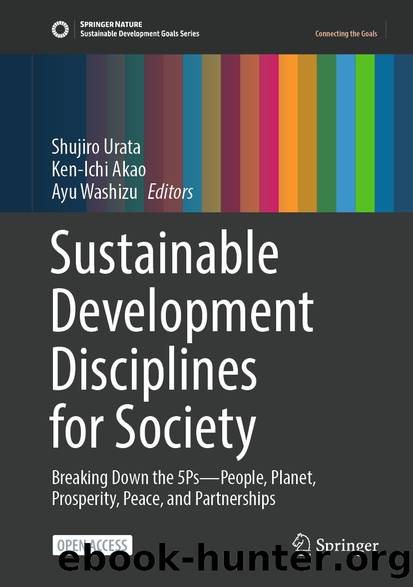Sustainable Development Disciplines for Society by Unknown

Author:Unknown
Language: eng
Format: epub
ISBN: 9789811951459
Publisher: Springer Nature Singapore
8.1 Introduction
Sustainable development is a central social value worldwide that compels us to think of the environment and our far-future descendants. As an introduction to the economics of sustainable development, this chapter presents theoretical results in economics regarding the conditions for achieving sustainable development. Conversely, however, the conditions also reveal the limiting factors that prevent society from achieving sustainable development. Furthermore, the chapter reveals the mechanism by which rational people willingly choose an anti-sustainable path, a situation known as the âtragedy of the commonsâ (Hardin 1968). These theoretical results contribute to promoting âsustained, inclusive, and sustainable economic growthâ in SDG 8 by helping to design a sustainable society and preventing policies that conflict with sustainable development.
Sustainable development has faced several controversies, as is common with important value concepts, such as liberty and human rights. In economics, the focus of the argument is the validity of standard economic models for studying sustainable development. Since the theoretical results in this chapter are derived from standard economic models, it is crucial to understand the controversies. By doing so, the implications and limitations of the theoretical results may be well-clarified.
This chapter begins with the controversies in economics surrounding sustainable development. One controversy is concerned with what should be sustained. Most economists believe that well-being should be sustained, a view called weak sustainability. Advocates of strong sustainability assert that the sustainability of natural capital should be considered in addition to well-being. Another controversy concerns intergenerational equity: the problem of how much we should sacrifice for the sake of the well-being of future generations. There are two dominant approaches to address this question: utilitarian and egalitarian. Moreover, there is controversy within the utilitarian approach over whether to discount future generationsâ well-being or not. The answer to this crucially affects the well-being of future generations.
Standard economic models are based on the concept of weak sustainability and take a discounted utilitarian view to evaluate future generationsâ well-being. At first glance, these concepts may be either unrealistic or ethically unacceptable. In fact, there have been disputes over them, even among economists. However, these alternatives are not without their own problems.
Climate change has been a central concern in economic research on sustainable development and has led to the aforementioned controversies.1 The present chapter addresses this issue and partly covers the economics of climate change that contribute to SDG 13: Climate Action.
Download
This site does not store any files on its server. We only index and link to content provided by other sites. Please contact the content providers to delete copyright contents if any and email us, we'll remove relevant links or contents immediately.
| Clergy | Devotionals |
| Faith | Inspirational |
| Meditations | Monasticism & Asceticism |
| Prayer | Prayerbooks |
| Ritual | Sermons |
The Secret Power of Speaking God's Word by Joyce Meyer(3220)
More Language of Letting Go: 366 New Daily Meditations by Melody Beattie(3030)
The Holy Spirit by Billy Graham(2953)
To Light a Sacred Flame by Silver RavenWolf(2823)
Tuesdays With Morrie by Mitch Albom(2762)
The Lost Art of Good Conversation by Sakyong Mipham(2654)
The Traveler's Gift by Andy Andrews(2461)
Kundalini by Gopi Krishna(2185)
A Kingsbury Collection by Karen Kingsbury(2105)
Anxious for Nothing by Max Lucado(1976)
Angels of God: The Bible, the Church and the Heavenly Hosts by Mike Aquilina(1969)
Finding Chika by Mitch Albom(1968)
Angels by Billy Graham(1926)
As a Man Thinketh by James Allen(1902)
Curse Tablets and Binding Spells from the Ancient World by Gager John G.;(1862)
The Yoga of Jesus: Understanding the Hidden Teachings of the Gospels by Paramahansa Yogananda(1862)
Autobiography of a Yogi (Complete Edition) by Yogananda Paramahansa(1827)
Barking to the Choir by Gregory Boyle(1822)
How To Be Born Again by Billy Graham(1782)
